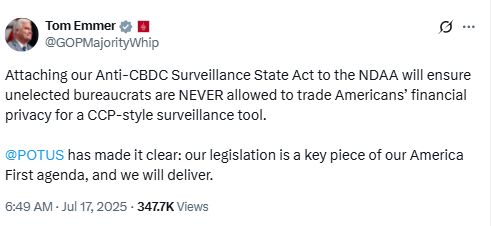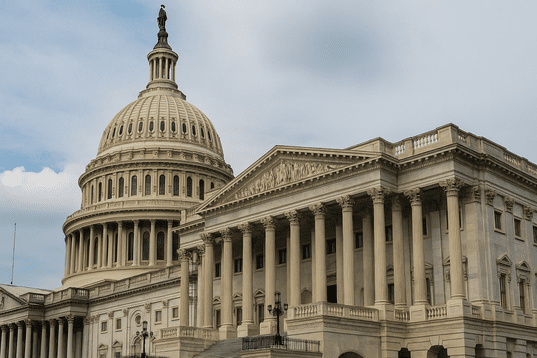The US House has inserted a CBDC ban into the National Defense Authorization Act (NDAA), a nearly 1,300-page defense policy bill for fiscal year 2026.
The measure prohibits the Federal Reserve from creating, testing, or studying a central bank digital currency.
A revision of HR 3838, released by the House Rules Committee, includes sweeping text to stop the Federal Reserve from issuing any form of digital currency or providing financial services directly to individuals.
The language makes an exception for stablecoins, stating the measure does not prohibit “any dollar-denominated currency that is open, permissionless, and private.”
The defense policy bill is considered “must-pass” legislation because it outlines military funding and spending. Lawmakers often attach non-defense provisions to such bills to secure passage.
Previous Anti-CBDC Bill Narrowly Passed
In July, the US House passed the Anti-CBDC Surveillance State Act with a slim 219–210 vote.
That bill directly banned a Federal Reserve-issued digital currency but faced an uncertain path in the Senate.

By attaching the CBDC ban to the National Defense Authorization Act, lawmakers increased the chances of enactment.
The NDAA’s passage is critical for national security funding, making it a vehicle for unrelated but contested provisions.
The push came after a standoff in July when a group of Republican holdouts refused to advance three crypto bills without a guarantee that a CBDC ban would move forward.
The delay lasted more than nine hours, marking the longest vote stall in House history. House Majority Leader Steve Scalise resolved the standoff by agreeing to add the CBDC ban to the NDAA.
Limits on Federal Reserve Powers
The provision in the defense policy bill explicitly prevents the Federal Reserve from issuing or developing any digital asset. It states the Fed may not “test, study, develop, create, or implement” a CBDC.
It also blocks the Fed from providing direct financial products or services to individuals. Supporters argue this ensures limits on the central bank’s role in digital assets.
At the same time, the measure draws a line between CBDCs and stablecoins. Privately issued, dollar-backed stablecoins remain unaffected by the restrictions, provided they are open and permissionless.
Republican Drive Against CBDCs
The CBDC ban is part of a broader Republican agenda. House leaders have worked on such measures since the previous Congress.
Representative Tom Emmer first introduced the “CBDC Anti-Surveillance State Act” in early 2023. That version did not advance and expired with the last Congress.
Emmer later reintroduced the bill in the current session, and Republicans tied the effort to President Donald Trump’s January executive order blocking CBDC development.
By aligning the legislative proposal with the executive order, party leaders reinforced their opposition to a Federal Reserve digital currency.
With the CBDC ban now attached to the National Defense Authorization Act, its chances of advancing are higher, though the Senate still holds the final say on the provision.
Disclosure:This article does not contain investment advice or recommendations. Every investment and trading move involves risk, and readers should conduct their own research when making a decision.
Kriptoworld.com accepts no liability for any errors in the articles or for any financial loss resulting from incorrect information.

Tatevik Avetisyan is an editor at Kriptoworld who covers emerging crypto trends, blockchain innovation, and altcoin developments. She is passionate about breaking down complex stories for a global audience and making digital finance more accessible.
📅 Published: August 22, 2025 • 🕓 Last updated: August 22, 2025


